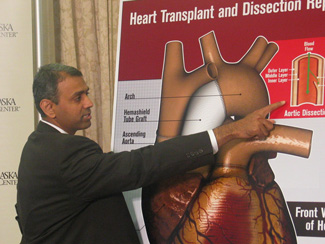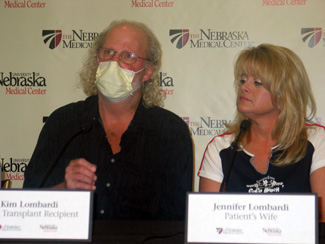 |
Mohammed Quader, M.D., explains aortic dissection. |
On Aug. 18, transplant surgeon Mohammed Quader, M.D., performed a specialized heart procedure for what’s thought to be one of the first times in North America, and possibly just the third time in the world.
Dr. Quader is director of Heart Transplantation and Ventricular Assist Device Therapy at The Nebraska Medical Center and assistant professor of cardiothoracic surgery at UNMC. His patient, 54-year-old Kim Lombardi of Omaha, sought help from several places including a recent trip to a world-renowned clinic earlier this summer. There, he was told he wasn’t a candidate for surgery and there was little beyond medication that anyone could do to help.
“They said to go home and get my affairs in order and enjoy what life I had left,” Lombardi said. “It was a dark time. I was not ready to give up hope.”
Back in Omaha, he learned other medical centers across the country weren’t willing to help either. A referral from a local cardiologist brought him to the advanced heart failure and heart transplant program at The Nebraska Medical Center.
 |
Kim Lombardi and his wife, Jennifer. |
Dr. Quader and the heart transplant team assessed the situation and decided there was only one option left. Lombardi was listed for a heart transplant.
“Mr. Lombardi was too young to be left to die,” Dr. Quader said. “We had to do more for him and his family.”
Just seven days later Lombardi received a surprising phone call telling him a heart might be available. He described his initial reaction as shock. “I couldn’t believe it. I’d only waited for a week. I started crying as we were talking.”
Lombardi then called his wife, Jennifer, who had gone to the gym for a quick workout. “I thought he was teasing,” she said. “Kim’s quite a joker – but then I could tell he was serious by the tone of his voice.”
Strangely enough, she had almost forgotten to take along her cell phone and ran back inside the house to grab it, taking a ribbing from her husband who insisted, “Don’t worry about it. You won’t be gone long, you won’t even need it.”
The phone calls – and later that night, a lifesaving surgery – gave the family a new outlook and a promising future.
“We tell everyone it’s a miracle. God sent us to the medical center, there’s no doubt in my mind,” Jennifer Lombardi said. “All of a sudden we have a second chance at life.”
That second chance was made possible by a combination of two procedures. Dr. Quader first needed to fix the dissection. He removed the damaged part of the aorta and replaced it with a specially-engineered fabric called a Hemashield tube graft. That material will stay in the body and becomes a permanent piece of the cardiovascular system. In this case, it replaces the ascending aorta.
Once the graft had been stitched into place, Dr. Quader attached the new heart. While transplantation and repairs of the aorta are considered more traditional treatments, the combination of the two – especially in one surgery – is extremely rare.
“His surgery went well and I am very confident Mr. Lombardi will make a steady recovery,” he said. “In less than two days he was out of intensive care and walking around and enjoying company. You could easily sense a different atmosphere around him and his family.”
“Before the operation, I was just waiting to see what would happen,” Lombardi said. “Was my heart going to fail, was the aneurysm going to burst or was I going to get a new heart?”
Lombardi believes a guardian angel was watching over him. Twelve years ago, his 16-year-old son was killed in a tragic crash near 168th and State Streets in Douglas County.
Jaydn Lombardi, his best friend Matt Guilfoyle and Janelle Papillon lost their lives. Only the young driver survived.
“I know my little guy was with me. We’ve been through some extremely tough times,” Lombardi said. “It’s good to have hope again. It’s awful having that taken away from you.”
Prior to his heart trouble, Lombardi had been an active speaker on the issue of underage drinking. Depending on how his recovery goes, he says he might revive that career. “It would be great to help educate people about organ donation. It’s a decision that hits at a terrible time for families, but so much good comes from it.”
A total of 17 heart transplants have been performed by the team at The Nebraska Medical Center since late September 2005, making it the most active heart program in Nebraska and Iowa. This also is the first time that any heart transplant program in the state has exceeded more than 12 transplants in one year.